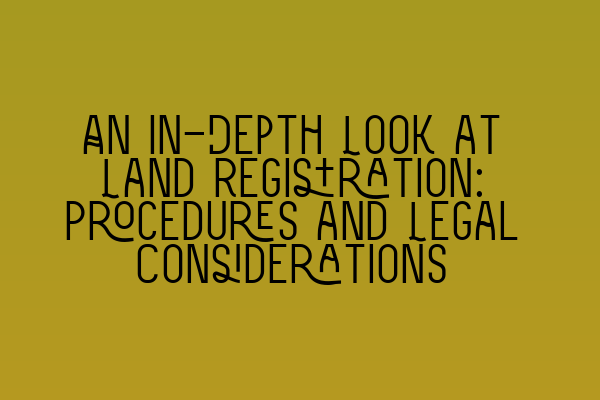An In-Depth Look at Land Registration: Procedures and Legal Considerations
Land registration is an important process in property law that provides conclusive proof of ownership and interests in land. It involves the registration of transactions and rights relating to land, as well as the creation and protection of legal rights over land.
Why is Land Registration Important?
Land registration serves a vital purpose in ensuring transparency and security in property transactions. It provides a publicly accessible record of ownership and rights over land, which helps to prevent fraud, disputes, and conflicting interests. By registering land, owners can establish their legal rights, while potential purchasers and lenders can easily investigate the history and title of the property.
The Land Registration Procedure
The land registration procedure involves several key steps to ensure a smooth and accurate registration process:
- Application for Registration: The process begins with the submission of an application for registration to the relevant land registry. This application includes details about the land, ownership, and any third-party interests.
- Examination and Verification: The land registry examines the application and verifies the information provided. They may request additional documentation or clarification from the applicant.
- Notice and Consultation: In some cases, the land registry is required to notify and consult with other parties, such as neighboring landowners or previous owners, who may have an interest in the land.
- Official Entries: Once the application is approved, the land registry makes official entries in the register, establishing the legal ownership and any registered interests over the land.
- Issue of Title Deed: Upon completion, the land registry issues a title deed, which serves as an official document proving ownership and interests in the land.
Legal Considerations in Land Registration
During the land registration process, it is important to consider various legal aspects to ensure a valid and enforceable registration:
- Lawful Ownership: The applicant must prove lawful ownership of the land and provide evidence of their right to register it. This may include proving a valid purchase or inheritance, or establishing adverse possession.
- Third-party Interests: Any third-party interests, such as mortgages, easements, or restrictive covenants, should be disclosed and registered accordingly. Failure to disclose such interests may affect the validity of the registration.
- Priority of Interests: The priority of registered interests is determined based on various factors, including the date and time of registration. Understanding the rules governing priority is essential to protect one’s interests in case of competing claims.
- Fraud and Rectification: Land registration systems provide protection against fraud, but mistakes or fraudulent registrations can still occur. The law allows for rectification of the register in cases of fraud or mistake, but such claims must meet specific legal requirements.
Conclusion
Land registration is a crucial step in property transactions, providing certainty and security in ownership and rights. By following the appropriate procedures and considering the legal considerations involved, parties can ensure a valid and enforceable registration. If you’d like more information about land registration or need assistance with any property law matters, don’t hesitate to contact our expert solicitors at SQE Property Law & Land Law.
Related Articles:
